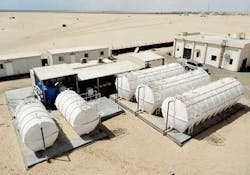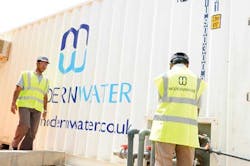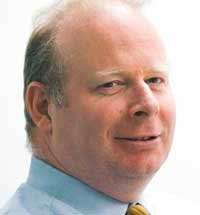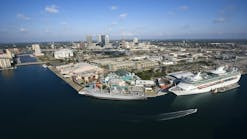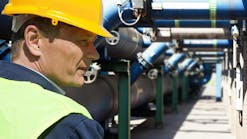Not only has the UK's Modern Water taken a university R&D project and made it into a multi-million pound business, it is also the first company worldwide to use forward osmosis technology for drinking water on a commercial scale. Tom Freyberg catches up with executive chairman Neil McDougall to find out what's next.
Many countries around the world are renowned for particular foods. Take chocolates from Belgium, snails from France or the much loved hamburger from the US.
Likewise, in the global water sector many countries can boast international, big-hitting companies. Take Veolia and Suez from France, or GE from the US, or Grundfos from Denmark.
But what about the UK? Surely when it comes to food and water the country is renowned for more than soggy fish and chips and utilities' failed attempts at privatisation overseas?
One company is trying to change this. And this one company - Modern Water - could be called desalination's new kid on the block.
Water professionals will be aware of the fundamental basics of reverse osmosis (RO) – forcing water through a membrane to leave behind salts or contaminants. But what about turning this tried and tested method on its head and calling it forward osmosis? How about going on to say this new method can save up to 30% of energy compared to traditional technologies?
And then how about signing agreements with China's largest desalination company after opening the world's first commercial scale FO plant in Oman? Ambitious, you might say.
Forward Osmosis spark
To answer the question of "how" most of you are probably asking, it's worth going back to the start of the Modern Water story. It was in 2006 when executive chairman Neil McDougall was invited to work at the University of Surrey in England.
Initially there to discuss funding a philanthropic project for the developing world, it was by chance that McDougall bumped into Adel Sharif, professor of water engineering and process innovation. It was perhaps this chance meeting that in hindsight can be seen as the spark for how the company was started.
"I was invited to stay to listen to what Professor Sharif had to say. He told such an extraordinary story of the technology with huge applications," says McDougall proudly.
"He pointed out that it would work more efficiently and result in lower power costs and produce high quality water. On the back of that I did my own checks and that's really how Modern Water started."
Later that year Modern Water was formed in December 2006. Manned only by three people, it then carried out an initial public offering (IPO) to float on the Alternative Investment Market in 2007.
"Historically the US has been good at finding ideas in North American Universities and then developing them out and creating multi-billion businesses. The UK has been less successful. What I really wanted to do with the team is to show how you can find a great idea at a British University and expand and develop it to roll out on an international scale," explains McDougall.
International roll out between the rock of Gibraltar and a hard placE
As with taking any R&D stage project through to the commercial world, challenges are inevitable. "We faced huge issues going from something that worked on a one off basis in a laboratory to working in the real world," says the executive chairman.
It turns out that British territory, Gibraltar, located at the southern tip of Spain, was to be Modern Water's first proving ground.
"We chose Gibraltar as it was reasonably close," says McDougall. "We had some good contacts there and the authorities had been extremely helpful in the process. They had put in a brand new plant using what I would call old fashioned, or traditional RO technology so it enabled us to compare the performance of FO compared to RO."
Delivered in a container, the 18 m3/day plant was producing drinking water with 30% less energy than the RO set up, after a settling in period. It also produced results the company wasn't expecting. Membrane fouling was said to be "virtually non-existent", as well as the removal of other contaminants such as boron. The site has been adding water into the public supply since 2008.
Despite the island having its own geographical challenges, the Gibraltar trial could be seen as relatively straight forward with "typical Mediterranean" water to treat. This was obviously just the start for an ambitious executive chairman.
A former CEO of Cascal and director of Biwater, McDougall had the international experience to really advance the forward osmosis concept. It was in Oman where he sought his next challenge.
Omani challenges
To find more "testing conditions", the British start-up looked towards the Middle East. The reason? "A lot of traditional RO which had worked successfully in North America or Europe but struggled with the more testing conditions that you find in the Middle East," he says.
The so-called difficult location was found at Al Khaluf in Oman – 450 kilometres from capital city Muscat. The authorities were said to be struggling to produce water that was consistently drinkable using an RO system.
"It was a perfect location as it was so extraordinarily difficult – high levels of salinity and contaminants in the water," explains McDougall. "The water intake is extremely poor and sand comes in."
Clearly this is a man who likes a challenge. The 100 m3/day facility, despite being substantially larger than the 18 m3/day Gibraltar operation was still seen as only a test plant by the company. Yet they believe that the 30% energy improvement they've already seen with the technology could be even higher at this site.
"In Al Khaluf, we haven't done a chemical clean of our membranes whereas traditional RO has to do numerous cleans and has to replace the membranes on a very regular basis. We don't even have any chemicals on site there we're so confident about the process."
With Al-Khaluf up and running, Modern Water was on a roll in Oman. Next up was the world's first commercial forward osmosis desalination plant at Al Najdah. It was the 200 m3/day scale of this plant that really could be considered a quantum leap from a laboratory R&D project.
Oman's Public Authority for Electricity & Water awarded Modern Water the £420,000 contract. At the end of last year the plant was operating and producing water at full scale. Currently the British firm is running the plant on a 12-month operation and maintenance contract.
Convincing the market
It has taken a long time for membrane desalination technologies to be fully accepted in regions such as the Middle East. Thermal desalination has simply been looked upon in the past as reliable and robust. It can be difficult to change mindsets and technology favourites among utilities unwilling to take risks in difficult climates. This raises one immediate question: how does the company expect to "sell" this process which, compared to RO, could be seen as unproven? For Modern Water, it is not just in new facilities where it believes FO can excel.
"The Middle East is different compared to convincing the Chinese market – it knows RO and it knows thermal," he says. "People there who have been working with RO for 25 years know its benefits and limitations. To get into that market was initially quite difficult so that's why it was really only places like Al Khaluf where they had tried everything else and nothing worked."
So where existing technologies are struggling with local conditions – this provides a good sales opportunity for the company?
"If you take Saudi Arabia, Bahrain and the UAE – in a lot of these places there's a number of plants where they still struggle to cope with the conditions and that's obviously a very interesting marketplace for us. We don't only do new builds but can also retrofit our technology into existing plants. It's an important part of our sales process.
"In the Middle East there's a number of plants that are coming to the end of their natural life and they need a spruce up and spring clean. We can do that and introduce the latest technology to the existing infrastructure."
Membrane competition
The RO market is competitive to say the least. Companies such as Dow, Toray, Koch Membranes and Hydranautics, not to mention smaller players, are all competing to win contracts in what is becoming a crowded marketplace.
So how do existing RO companies and newer entrants feel about Modern Water's new take on desalination? Is the company happy to be seen "shaking" things up?
"When we started out post our IPO we knew we had a lot of development to do before rolling it out on a commercial scale," says McDougall. "We deliberately kept a low profile. You wouldn't have seen any interviews with us and we didn't speak at conferences because we were really focusing on resolving the technical issues, which we've now satisfactorily done. Following the success in Gibraltar, Middle East and China we are beginning to make much more of an impression."
McDougall is clearly proud of the fact that Modern Water already has hard facts and figures to prove technology sceptics wrong.
"Two years ago when I was at a big conference, somebody said there won't be an FO plant for at least 10 years," he says. "I knew we were already producing water in Gibraltar for the best part of two years at that stage."
The million dollar question then has to be if this company could be seen as a threat to established RO practises, and a real game changer in the desalination energy world, who is a threat to Modern Water in the forward osmosis arena?
"In terms of forward osmosis for desalination purposes, we are years ahead of anybody else – at least five if not 10 years ahead," he says.
"There's nobody that I'm aware of, particularly for drinking water purposes who have anything like we have. Nobody else has a large scale plant. Our technology is fully protected – we have over 99 patents now. It would be very difficult for somebody to try and catch up to where we are."
He refers to companies in the US who are moving into FO membrane manufacturing but adds that none of them have working examples of desalination projects.
Industrial water and KuwaiT
Proving FO for drinking water processes is one achievement worth shouting from the rooftops about. Yet for the group, at this stage it's not the biggest generator of revenue.
The company's year-end financial results released in March showed that sales of desalination equipment returned £334,000. Despite impressive growth from the previous year (£46,000), it is industrial water where McDougall believes could return greater revenues and also greater energy savings.
At the end of last year, Modern Water signed an agreement with Kuwait's Kazema Global. The partnership will see FO being used to produce make-up water for district cooling and industrial evaporative cooling systems. With estimates suggesting the refrigeration industry in the Middle East will almost quadruple in size by 2015, it appears the company has seen the potential.
"I suspect the industrial water sector for us will be a much larger market for us than the drinking water side," says the executive chairman. "Kazema are the largest cooling water operator in Kuwait as well as a number of other countries. They are very close to Qatar and Qatar has very significant cooling requirements, so we look forward to working with them on numerous projects. We're also in discussions in other parts of the world about linking up with other industrial water developers."
Taming the Chinese dragon
If the Kuwait and Al Najdah announcements weren't enough to get shareholders excited at the end of last year, Modern Water still had one major piece of news up its sleeve: China.
In December 2012 the company signed a Framework Agreement with Hangzhou Development Center of Water Treatment Technology in the People's Republic of China.
Involved in 60% of China's current or planned desalination projects, Hangzhou Water will identify opportunities with Modern Water providing technical assistance.
"China is a fascinating market place," enthuses McDougall. "The problem that China has is that they don't have the volume of water. In terms of availability of water per head of population they are about the 14th worst country in the world and that's exacerbated by the fact that water is in the wrong part of the country. The growth is happening in mainly the North and the East of the country and most of the water, albeit quite limited, is in the South and the West. The infrastructure to transport that water clearly isn't there.
"One of the key things they are looking at doing is developing their desalination sector very rapidly. It's growing very quickly and forecast to grow 25% year on year. The UN estimates in a few years time China will be the second largest market for desalination after Saudi Arabia."
So does this mean China could be the second nation to adopt forward osmosis after Oman? According to McDougall, this could well be a resounding yes. "We have a plan working with Hangzhou Water to develop a number of projects using FO."
Water monitoring
Whle the interview could easily carry on into the rest of the afternoon on forward osmosis alone, there is one area which cannot be ignored: water monitoring. While this side of the business might not grab as many headlines as the group's desalination activity, it nonetheless provides the lion's share of revenue. And it is how the group first broke into the Chinese market.
In 2012 water monitoring product sales yielded £3.4 million. This figure is more impressive when put alongside the previous year's £1.2 million. Part of this success comes down to an acquisition of US firm SDIX's water quality division for $4.5 million back in 2011.
This purchase allowed the firm to develop three key areas in monitoring: toxicity, trace metals and environment. The company also opened two new premises with laboratories in Delaware, US and in Cambridge, UK.
Final thoughts
Modern Water has made a name for itself, in and out of desalination circles, for its forward osmosis technology. Its water monitoring division, although run as a separate business, obviously provides key funding for the group's R&D activity to bring down membrane energy requirements even further. McDougall believes that for industrial cooling water this could eventually be as much as a 50% saving compared to RO water.
It is a surprise to me that the company is even involved in wastewater processing, despite not making it well known at this stage. Patented technology can be used to treat wastewater in a saline environment, such as toilet flushing using seawater.
Clearly, with 2012 proving such a busy year for Modern Water, we cannot expect the firm to rest on its laurels in 2013. McDougall even has his crosshairs set on the next target.
"This is just the beginning in terms of the efficiency and number of applications for FO. We are very keen to work with someone in the oil and gas sector and fracking where there's huge potential for FO."
So there we have it: the story of how to take a university project and in only six years develop it into a multi-million pound, global company. Just like with RO trying to break into the Middle East years ago, the company's FO technology will inevitably face scepticism from what can be a stubborn industry when it comes to accepting such innovation. But with three projects up and running and data to prove it, this is unlikely to stop the company's current momentum.
The UK might not be renowned for its culinary delights overseas, but it should be proud of Modern Water and its forward osmosis technology.
Tom Freyberg is chief editor of WWi magazine. For more information please email: [email protected]


